Review Roundup: Sean Hayes Stars In GOOD NIGHT, OSCAR On Broadway!
The play is written by Pulitzer Prize-winner Doug Wright and directed by Lisa Peterson.
The new American play, Good Night, Oscar starring Sean Hayes opens on Broadway tonight, April 24, at the Belasco Theatre. Written by Pulitzer Prize-winner Doug Wright and directed by Lisa Peterson, Good Night, Oscar's 20-week limited engagement will end on August 27. Read reviews for the production below!
In addition to Sean Hayes, the cast includes Emily Bergl as June Levant; Marchánt Davis as Alvin Finney; Peter Grosz as Bob Sarnoff; Ben Rappaport as Jack Paar; Alex Wyse as Max Weinbaum; and John Zdrojeski as George Gershwin. Understudies Sam Bell-Gurwitz; Thomas Michael Hammond, Stephanie Janssen, Postell Pringle and Max Roll complete the cast.
In Good Night, Oscar, Sean Hayes plays Oscar Levant: Hollywood actor, concert pianist, and the most subversive wit ever to appear on television during its Golden Age.
It's 1958 and Jack Paar is hosting "The Tonight Show." He's booked his favorite guest, a pundit as hilarious as he is unpredictable: Oscar Levant, who once famously proclaimed, "There's a fine line between genius and insanity, and I have erased that line." In 90 short minutes, Oscar will have audiences howling, censors scrambling, and - when it's all over - America will be just a little less innocent than she was before.
The creative team for Good Night, Oscar includes Rachel Hauck (Set Design), Emilio Sosa (Costume Design), Carolina Ortiz Herrera and Ben Stanton (Lighting Design), Andre Pluess (Sound Design), Chris Fenwick (Music Supervision), J. Jared Janas (Wig, Hair and Make-Up Design), Stephen Kopel (Casting), and Jacqueline E. Lawton (Dramaturgy).
Jesse Green, The New York Times: Oscar Levant, the troubled midcentury musician and wag, often said he’d erased 'the fine line between genius and insanity.' He says it again, or a version of it, in 'Good Night, Oscar,' the unconvincing biographical fantasia that opened Monday at the Belasco Theater. But on the evidence of the character as written, and especially as impersonated by Sean Hayes in a gloomy if accurate performance, Levant doesn’t erase the line so much as fudge it.
Jackson McHenry, Vulture: Then there’s that piano performance. The piece Hayes plays is, as it turns out, crucial to the plot, so I won’t get into it, but the way he plays it is more important than either the title or his skill (though yes, Sean Hayes can play the piano very well). He conveys depths in the way that Levant reluctantly slides back into his virtuosity over the course of the performance—a coiling resentment of and yet thrill at his own talent. The play, having hit its high point, wraps up quickly soon after, and it’s a letdown to return both Hayes and Oscar to earth. There’s a lesson in there: to understand performers, you have to see them in action, no amount of describing can substitute. But if you nail that re-creation, you can get at something deep about them. The playing’s the thing, to mangle that another famous quote-vehicle, wherein to catch their consciousness.
, The New York Daily News: It’s not so much that Hayes, whose work as Levant has only deepened since I first saw it in Chicago, sets out here to impersonate as to channel Levant’s psychological and performative state of being. All in all, it’s a spectacularly intense and unstinting performance, a Broadway tour-de-force wherein the honest work bespeaks of a beautiful homage to this phenomenally talented real-life character, a perennial second banana previously in danger of being forgotten in the passage of time. How many non-retirees remembered him prior to the buzz around this show?
Johnny Oleksinski, The New York Post: But near the end, Levant gets behind the piano and plays Gershwin’s 'Rhapsody in Blue' on NBC. Hayes, a gifted piano player himself, does this in full view of the audience — and from memory. That thrilling moment — without mannerisms, words, other characters or exposition — is the only time Levant and 'Good Night, Oscar' come to life.
Tim Teeman, The Daily Beast: Theater-goers should not expect 'Just Jack!' when they take their seats. The play, directed by Lisa Peterson, is a very slow, low burn, whose ultimate conflagrations of both humor and music—care of a bravura, piano-playing Hayes—are dazzling. However, the play takes time to locate its drive and punch. For a sludgy opening stretch, Good Night, Oscar—set in two dressing rooms and eventually The Tonight Show studio, all simply and beautifully designed by Rachel Hauck—is mostly plodding exposition.
Greg Evans, Deadline: And before you ask Phyllis Who?, consider that even those of fleeting fame can make for fine, compelling biographies. Wright, Hayes and director Lisa Peterson are likely very sure that Levant ranks among that list, but Good Night, Oscar is less than convincing.
Christian Lewis, Variety: But the largest fault of the play may be its conventionality. It is without a doubt a well-made play, with clear structure and stakes, tight pacing, funny jokes and concisely rendered characters. But it does not push the envelope in any way — which is a shame, considering that is exactly what Oscar Levant was famous for. Still, Hayes’ performance in 'Good Night, Oscar' demands to be seen. Though the play itself may not be memorable, Hayes’ acting feat undoubtedly is.
Lester Fabian Brathwaite, Entertainment Weekly: Hayes' piano solo — and the beautiful way it is lit by Carolina Ortiz Herrera and Ben Stanton — easily ranks as the show's highlight, but aside from a few lulls in the early stages of exposition, before Hayes makes another memorable entrance, the entire play is delightful, buoyed by its leading man's performance. "I'm controversial! People either dislike me or hate me," Hayes as Levant quips, another of Levant's reworked old jokes. While Hayes' Levant is an acerbic, self-destructive, sad-sack of a human being, there's nothing to hate or even dislike about him. Or Good Night, Oscar. Sean Hayes is just too easy to love.
Charles McNulty, The Los Angeles Times: 'Good Night, Oscar' provides a vehicle for Hayes to be snappy and tragic. Ironically, his performance is the least sitcom-y thing in the production. The weight of Levant’s mental illness comes through with powerful monotony. This condition isn’t a costume that can be discarded at will. I didn’t buy the business with Gershwin (John Zdrojeski), who makes ghostly visitations that exacerbate Levant’s envy and self-doubt. The psychiatric distress of Hayes’ Levant isn’t susceptible to simple explanations. The character may be living his professional life in the shadow of a superior artist, but the roots of his disorder must be more multifaceted.
Juan A. Ramirez, Theatrely: A neurotic hypochondriac, possibly suffering from Obsessive Compulsive Disorder and Schizophrenia, and definitely suffering from the weight of his intellect, Levant is a fascinating figure, portrayed by Hayes in a mannered, hand-wringing performance that’s as full of tics as it is charged with pathos. He enters Rachel Hauck’s clever set, which finds the common ground between padded cell and soundstage, and immediately blows the rest of his castmates’ stiff deliveries out of the water. Not to be too hard on the ensemble who, to their credit, are doing their best with a wooden, unoriginal script and Lisa Peterson’s farcical direction. Again and again, we learn that a star’s entourage might not have their best interests at heart, that talent is burdensome, and fame is a prison, et cetera. And creaky exposition fills us in on the man’s bonafides—though it is nice to learn about this icon of mid-century American culture
David Finkle, New York Stage Review: It could be that Good Night, Oscar exists as much as anything for handing Hayes an at-the-ivories tour de force. Otherwise, his Levant portrayal is strong enough. He bumbles and stumbles across Rachel Hauck‘s couple of NBC studios, constantly entrenched in Levant’s havoc, lighting up as obsessively as Levant did. Perhaps aficionados won’t be entirely watching the commanding grouse their guy was, but Hayes adulators will assume they’re getting the real thing. Could be the same for old-time Paar-tisans. Rappaport doesn’t seem to be out to impersonate the man and his assured-yet-uncertain-of-himself manner. He gets much of the Paar’s professionally charming ways when in front of television cameras. The other cast members, Bergl chief among them, respond to Peterson’s serviceable direction. As for the audience groups cited above: Good Night, Oscar has something, if not everything, for all three.
Roma Torre, New York Stage Review: Fans of Will & Grace, you ain’t seen nothing yet. Sean Hayes is delivering a tour-de-force performance, or shall I say a 'twofer-de-force' as he dazzles us with bravura skills as both actor and classical pianist. And if you think that this play set in 1958 about Oscar Levant—a man most audiences have never heard of–is too remote to hold much interest, you would be dead wrong. Good Night, Oscar is a captivating work, as hysterically funny as it is heartbreaking.
Brian Scott Lipton, Cititour: If the entrance applause for Sean Hayes is a little quieter than one might expect when he finally appears onstage at the Belasco Theater about 15 minutes into Doug Wright’s entertaining bioplay 'Good Night, Oscar,' it’s because much of the audience may not immediately recognize him, even after two decades of TV and theatre stardom. By the end, though, audiences can’t jump to their feet fast enough! To call Hayes’ work here 'a tour-de-force' performance is accurate, while not really doing it justice.
Amelia Merrill, New York Theatre Guide: With a less compelling performance from its lead, Good Night, Oscar would fall flat. Its first half suffers from a lack of urgency; its second is burdened by hacky late-night antics. Almost everyone but Hayes’s Levant is forgettable in both performance and characterizations. Hayes is a marvel, embodying Levant in voice, spirit, physicality, and, eventually, music. He shakes like he’s davening prayer, fidgets like he's inebriated, and yells like his mind has left him without a choice. Carolina Ortiz Herrera and Ben Stanton’s lighting design closes in on Levant as he hallucinates, fantasizes, and opines; these shifts, some subtle and some overt, call to mind the Brian Wilson biopic Love & Mercy, another exploration of both songwriting and schizophrenia. Rachel Hauck’s set serves as both recording studio and padded cell, further insulating Levant. Though the supporting personae fall flat, these design elements fuse with Hayes’s performance for a powerful and cohesive character study.
Howard Miller, Talkin' Broadway: There is a perhaps overused but most apt phrase to describe what is happening on stage at the Belasco, and that is "tour de force." Garlands all around for playwright Doug Wright, the wonderful cast, director Lisa Peterson, and, especially, for Sean Hayes, for whom this is a career-crowning achievement.
Jonathan Mandell, New York Theater: When Sean Hayes as the concert pianist and celebrated wit Oscar Levant sits down at the piano to play 'Rhapsody in Blue,' I thought at first that it was a recording and he was simulating the recital. But no, Hayes was himself a concert pianist before he was an actor, and his beautiful live rendition of Gershwin’s beloved jazz piano concerto is without question the highlight of 'Good Night, Oscar,' which is opening tonight at Broadway’s Belasco Theater. Unfortunately, there were few other highlights for me in this workmanlike production written by Doug Wright, directed by Lisa Peterson and starring Hayes that attempts a portrait of Oscar Levant.
Average Rating: 63.1%

|
Videos
TICKET CENTRAL
Recommended For You






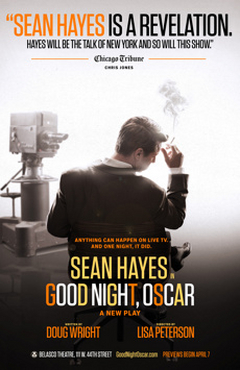
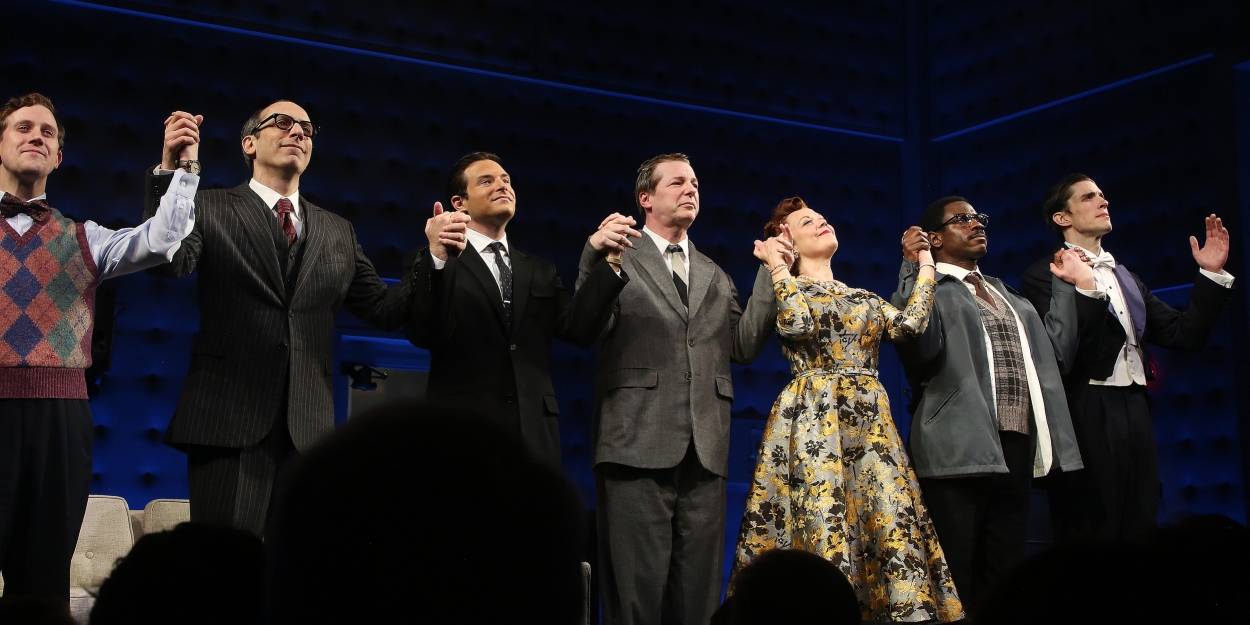
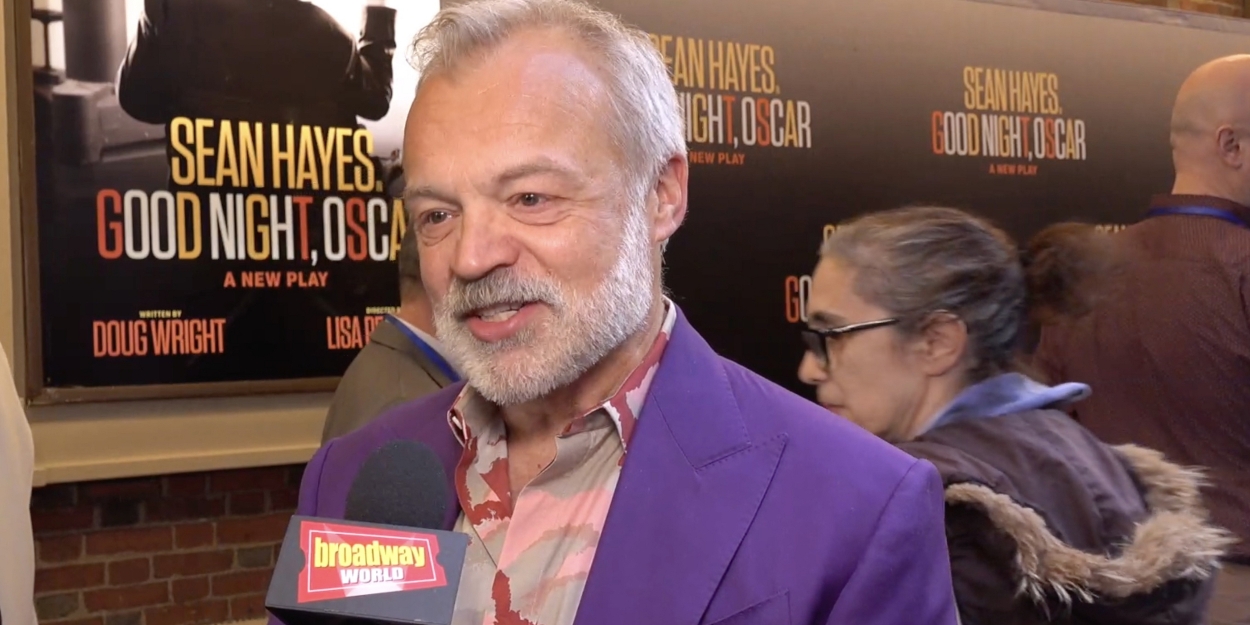


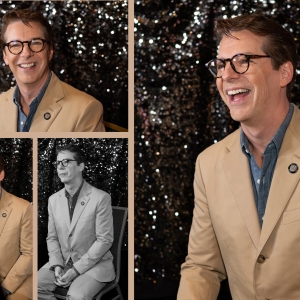
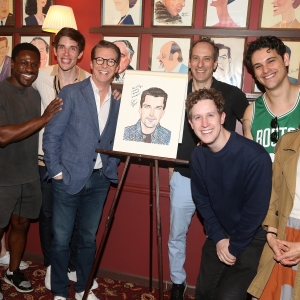
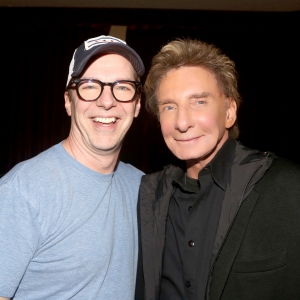

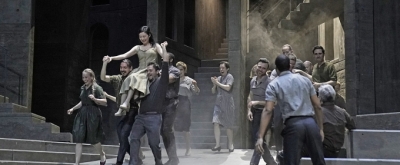
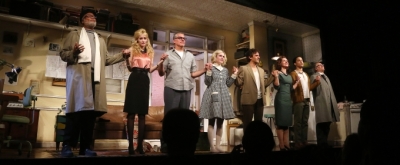
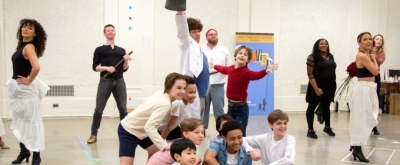
 Shucking Around with Ashley D. Kelley: SHUCKED Hits the Recording Studio
Shucking Around with Ashley D. Kelley: SHUCKED Hits the Recording Studio




